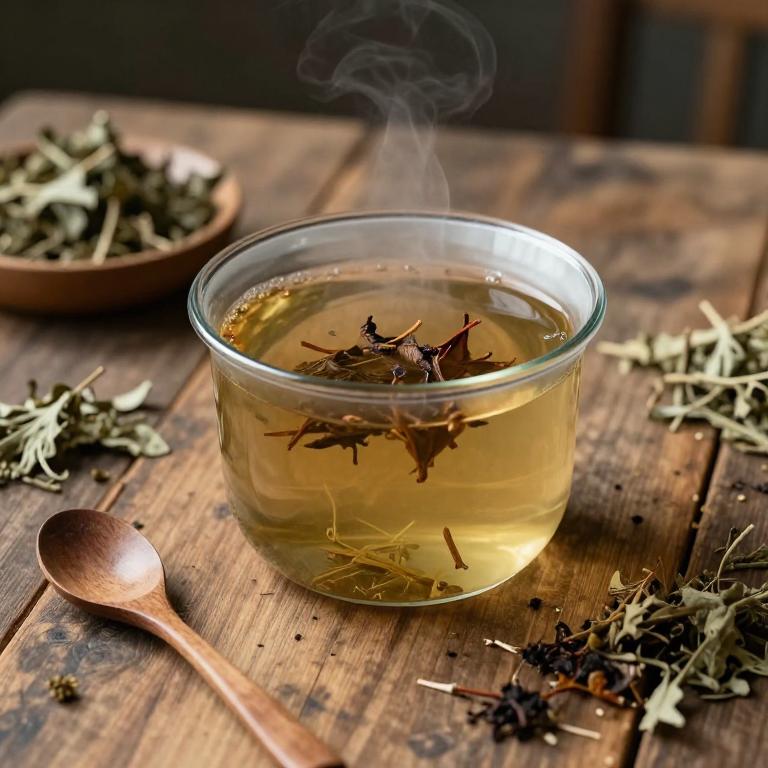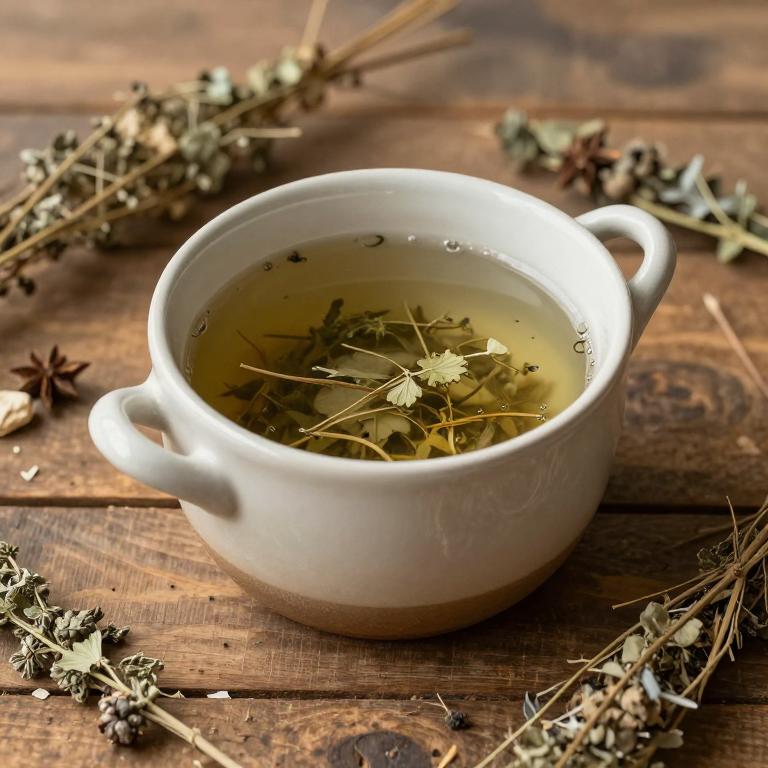10 Best Herbal Decoctions For Boils

Herbal decoctions have been traditionally used to treat boils by leveraging the anti-inflammatory and antimicrobial properties of various plants.
Common herbs such as echinacea, goldenseal, and calendula are often included in these decoctions to help reduce infection and promote healing. To prepare a decoction, the herbs are typically simmered in water for an extended period to extract their active compounds. Applying the warm decoction to the affected area can help soothe pain and drain the boil more effectively.
While herbal treatments may offer relief, they should complement, not replace, professional medical advice, especially for severe or persistent infections.
Table of Contents
- 1. Echinacea (Echinacea purpurea)
- 2. St. john's wort (Hypericum perforatum)
- 3. Aloe vera (Aloe barbadensis)
- 4. German chamomile (Chamomilla recutita)
- 5. Stinging nettle (Urtica dioica)
- 6. Marigold (Calendula officinalis)
- 7. Ginger (Zingiber officinale)
- 8. Cancer bush (Sutherlandia frutescens)
- 9. Blessed thistle (Cnicus benedictus)
- 10. English lavender (Lavandula angustifolia)
1. Echinacea (Echinacea purpurea)

Echinacea purpurea, commonly known as purple coneflower, is a popular herbal remedy used for its potential anti-inflammatory and immune-boosting properties.
Herbal decoctions made from echinacea are often prepared by simmering the dried roots, leaves, or flowers in water to extract their active compounds. Some studies suggest that echinacea may help reduce the severity and duration of bacterial infections, including those that cause boils, by enhancing the body's immune response. However, it is important to note that while echinacea may offer supportive benefits, it should not replace conventional medical treatments for boils, especially in severe or persistent cases.
As with any herbal remedy, it is advisable to consult a healthcare professional before use to ensure safety and appropriateness for individual health conditions.
2. St. john's wort (Hypericum perforatum)

Hypericum perforatum, commonly known as St. John's Wort, is traditionally used in herbal medicine for its anti-inflammatory and antimicrobial properties.
When prepared as a decoction, it involves simmering the dried herb in water to extract its active compounds, such as hypericin and hyperforin. This preparation is often applied topically to boils due to its potential to reduce inflammation and inhibit bacterial growth. The decoction may help soothe the affected area and promote healing by supporting the body's natural defenses.
However, it is important to consult a healthcare professional before using St. John's Wort, as it can interact with certain medications.
3. Aloe vera (Aloe barbadensis)

Aloe barbadensis, commonly known as aloe vera, has been traditionally used for its soothing and healing properties, including its potential efficacy in treating boils.
The gel extracted from the inner leaf of the aloe plant contains anti-inflammatory and antimicrobial compounds that may help reduce the redness, swelling, and infection associated with boils. When prepared as a herbal decoction, aloe vera can be applied topically to the affected area to promote skin healing and alleviate discomfort. However, it is important to note that while some studies suggest its benefits, more research is needed to fully confirm its effectiveness for boil treatment.
As with any natural remedy, it is advisable to consult a healthcare professional before using aloe barbadensis for persistent or severe boils.
4. German chamomile (Chamomilla recutita)

Chamomilla recutita, commonly known as German chamomile, has been traditionally used for its anti-inflammatory and antiseptic properties, making it a popular choice for treating boils.
Herbal decoctions made from chamomile flowers can be applied topically to the affected area to help reduce redness, swelling, and pain associated with boils. The active compounds in chamomile, such as bisabolol and chamazulene, contribute to its soothing and antimicrobial effects. To prepare the decoction, dried chamomile flowers are steeped in hot water for several minutes, then strained and cooled before application.
While generally safe for external use, it is important to perform a patch test and consult a healthcare professional if the boil shows signs of infection or does not improve with treatment.
5. Stinging nettle (Urtica dioica)

Urtica dioica, commonly known as stinging nettle, has been traditionally used in herbal medicine for its anti-inflammatory and detoxifying properties.
A decoction of stinging nettle can be prepared by simmering the dried leaves and stems in water for about 15 to 20 minutes, allowing the active compounds to infuse into the liquid. This herbal decoction may help reduce inflammation and promote healing in cases of boils by supporting the body's natural detoxification processes. Some practitioners recommend applying the cooled decoction topically to the affected area to soothe pain and expedite the healing process.
However, it is important to consult a healthcare professional before using stinging nettle, especially for individuals with allergies or those taking medications.
6. Marigold (Calendula officinalis)

Calendula officinalis, commonly known as garden marigold, has been traditionally used for its anti-inflammatory and antiseptic properties, making it a valuable herb in the treatment of boils.
Herbal decoctions made from calendula flowers can help reduce the redness, swelling, and pain associated with boils by soothing the affected area. To prepare the decoction, dried calendula flowers are simmered in water for about 15 to 20 minutes, then strained and applied as a warm compress. This natural remedy is often preferred for its gentle yet effective action on the skin.
While calendula decoctions can provide relief, they should not replace professional medical care for severe or persistent boils.
7. Ginger (Zingiber officinale)

Zingiber officinale, commonly known as ginger, has been traditionally used in herbal medicine for its anti-inflammatory and antimicrobial properties.
When prepared as a decoction, ginger can help reduce the pain and swelling associated with boils by promoting circulation and reducing infection. To make a ginger decoction, fresh ginger root is boiled in water for several minutes, allowing the active compounds such as gingerol and shogaol to infuse into the liquid. This herbal remedy is often used externally by applying the warm decoction to the affected area to soothe the skin and encourage healing.
While ginger decoctions may provide relief, they should not replace professional medical treatment for severe or persistent boils.
8. Cancer bush (Sutherlandia frutescens)

Sutherlandia frutescens, commonly known as cancer bush, is a traditional South African herbal plant that has been used for centuries in indigenous medicine.
Its aerial parts are typically used to prepare herbal decoctions, which are believed to possess anti-inflammatory and antimicrobial properties. These decoctions are often employed to treat boils due to their potential to reduce infection and promote healing of skin lesions. The active compounds in Sutherlandia frutescens may support the body's immune response and aid in the resolution of inflammatory conditions.
However, while some anecdotal evidence supports its use, further scientific research is needed to fully understand its efficacy and safety for treating boils.
9. Blessed thistle (Cnicus benedictus)

Cnicus benedictus, also known as blessed thistle, has been traditionally used in herbal medicine for its potential anti-inflammatory and antimicrobial properties.
A decoction made from the dried leaves and stems of this plant is often prepared by simmering them in water for several minutes to extract their active compounds. This herbal remedy is believed to help reduce swelling and promote the drainage of boils due to its mild antiseptic effects. However, it is important to consult a healthcare professional before using Cnicus benedictus for boils, especially for individuals with allergies or those taking medications.
While some people may find relief from using this decoction topically, it should not replace proper medical treatment for severe or persistent skin infections.
10. English lavender (Lavandula angustifolia)

Lavandula angustifolia, commonly known as English lavender, has been traditionally used in herbal medicine for its anti-inflammatory and antimicrobial properties.
Herbal decoctions made from lavender can be applied topically to boils to help reduce inflammation, soothe pain, and promote healing. To prepare the decoction, dried lavender flowers are steeped in hot water for several minutes, then strained and cooled before use. The essential oils in lavender, such as linalool and linalyl acetate, contribute to its therapeutic effects.
While lavender decoctions may provide some relief, they should not replace professional medical treatment for severe or persistent boils.